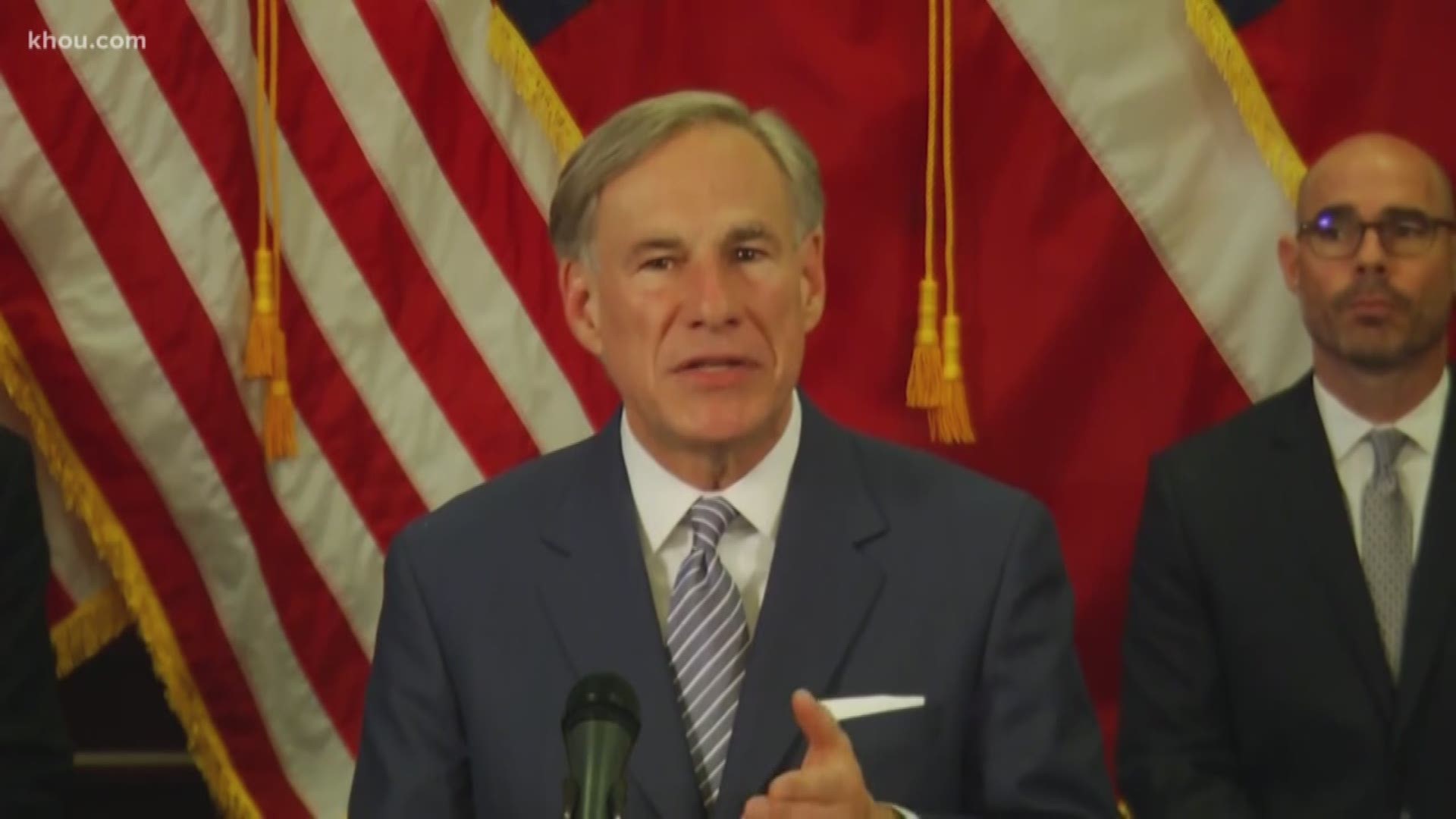AUSTIN, Texas — Texas Gov. Greg Abbott issued a series of executive orders Friday with several directives meant to gradually reopen the state.
First, the governor is establishing a strike force that includes medical experts, business leaders, educators and political leaders. This team will work together to find safe and effective ways to slowly re-introduce Texans to their usual way of life.
He said key members of the strike force include Rep. Dennis Bonnen, Attorney Gen. Ken Paxton, Lt. Gov. Dan Patrick and attorney Glenn Hegar.
The force will also have advisers from the business community such as jeweler Kendra Scott, Gallery Furniture owner Jim “Mattress Mack” McIngvale and restaurateur and Rockets owner Tilman Fertitta.
The strike force is broken into four core groups: economic revitalization, health care and fiscal accountability and federal liaison.
One of the biggest announcements regarded school districts and universities.
Abbott said public and private schools will remain closed for the remainder of the school year. He added educators and administrators will be allowed to perform administrative task from home, however.
The governor said he also plans to increase standards for nursing homes, senior living and hospice care facilitates.
Abbott announced the following re-openings and removal of restrictions with special stipulations:
Starting April 20, Abbott said state parks will be reopened. He added visitors will not be allowed to gather in groups larger than five people, must maintain social distancing and will be required to wear protective masks.
Starting April 22, Abbott said current restrictions on medical procedures will be lifted. At the moment, hospitals and other medical specialists are not allowed to perform nonessential procedures such as diagnostics test for cancer.
He said he'll start allowing surgeons to perform elective surgeries at a later date.
Starting April 24, Abbott said all retailers, including nonessential businesses, will be allowed to reopen with the stipulation they only offer curbside and delivery services.
On April 27, Abbott said he will announce additional guidelines for the reopening of Texas.
He said at that date, his team will share plans regarding comprehensive testing, assurances of hospital readiness and ways of protecting the state's most vulnerable residents while allowing others to increase their activity. He'll also include new information and guidelines for reopening some non-essential businesses.
Earlier this week
Abbott announced he would be going over details on jump starting the economy but emphasized it would be gradual and not everything would open all at once.
The governor did not offer additional details on the executive order but said the state was focusing on protecting lives while also restoring livelihoods.
Meanwhile, here in Houston, Mayor Sylvester Turner says he's not ready to release specifics on how the city will reopen during this coronavirus pandemic, but said that he's working with city, county and health leaders to develop a plan that will likely come in phases.
“But for people who want us to talk about opening up, it is not the time to do that. We will let you know when that time comes," the mayor said.
Instead he urged people to continue practicing social distancing and wearing face coverings. He also emphasized the importance of testing, something Harris County Judge Lina Hidalgo wholeheartedly agrees with.
Hidalgo said while she's also drafting plans on reopening the economy it won't happen until Harris County hits its peak and there's more widespread testing.
MORE TEXAS NEWS
Coronavirus symptoms
The symptoms of coronavirus can be similar to the flu or a bad cold. Symptoms include a fever, cough and shortness of breath, according to the Centers for Disease Control. Some patients also have nausea, body aches, headaches and stomach issues. Losing your sense of taste and/or smell can also be an early warning sign.
Most healthy people will have mild symptoms. A study of more than 72,000 patients by the Centers for Disease Control in China showed 80 percent of the cases there were mild.
But infections can cause pneumonia, severe acute respiratory syndrome, kidney failure and even death, according to the World Health Organization. Older people with underlying health conditions are most at risk for becoming seriously ill. However, U.S. experts are seeing a significant number of younger people being hospitalized, including some in ICU.
The CDC believes symptoms may appear anywhere from two to 14 days after being exposed.
Human coronaviruses are usually spread through...
- The air by coughing or sneezing
- Close personal contact, such as touching or shaking hands
- Touching an object or surface with the virus on it, then touching your mouth, nose or eyes before washing your hands.
Help stop the spread of coronavirus
- Stay home when you are sick.
- Eat and sleep separately from your family members
- Use different utensils and dishes
- Cover your cough or sneeze with your arm, not your hand.
- If you use a tissue, throw it in the trash.
- Follow social distancing
Lower your risk
- Wash your hands often with soap and water for at least 20 seconds. If soap and water are not available, use an alcohol-based hand sanitizer.
- Avoid touching your eyes, nose, and mouth with unwashed hands.
- Avoid close contact with people who are sick.
- Clean and disinfect frequently touched objects and surfaces.
- If you are 60 or over and have an underlying health condition such as cardiovascular disease, diabetes or respiratory illnesses like asthma or COPD, the World Health Organization advises you to try to avoid crowds or places where you might interact with people who are sick.
Get complete coverage of the coronavirus by texting 'FACTS' to 713-526-1111.

